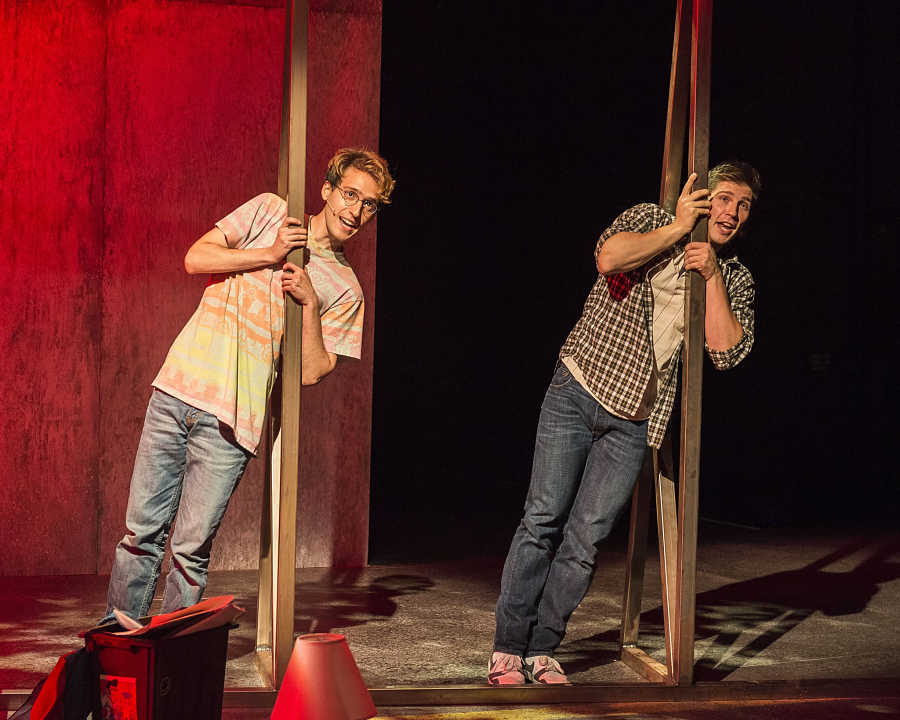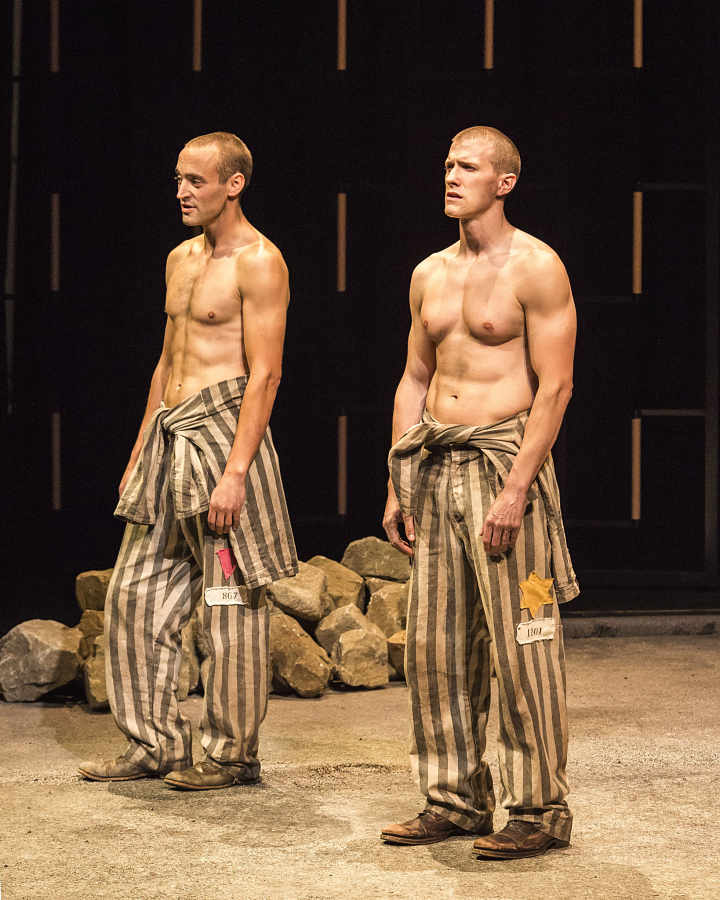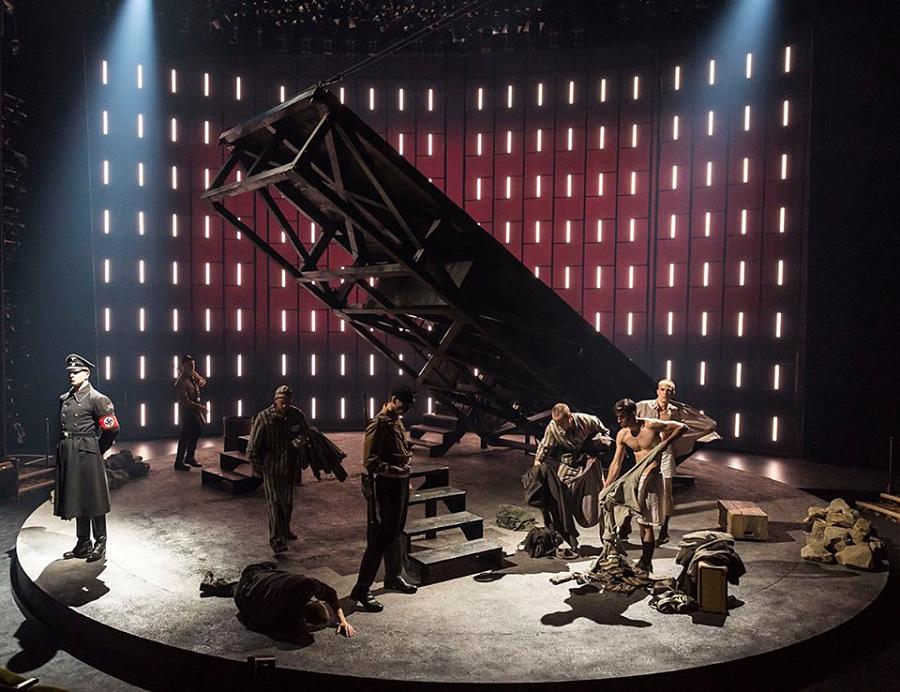On June 26, the United States Supreme Court ruled to legalize same-sex marriage nationwide. That day, both Bent and Girlfriend, two very different theatrical experiences focused on love stories between two men, were in rehearsals at Los Angeles’s Center Theatre Group.
“I felt like on that day the entire play was rewritten,” says Moisés Kaufman, Bent‘s director.
Martin Sherman’s 1979 play takes place in Germany between 1934 and 1936 and follows Max, a gay man in Berlin who does whatever it takes to survive the Holocaust. Though it crops up frequently in smaller theatres all over the world, the production, which began performances at the Mark Taper Forum in downtown Los Angeles on July 15 and runs through Aug. 23, is the play’s first major U.S. revival since its Broadway run starring Richard Gere. Kaufman concedes that many might question the timing of a play about persecution of homosexuals in a time of such forward progress for gay rights. But he feels that’s precisely why it’s necessary to remember a period in history that even today is not widely discussed.
“I think this is a moment to both celebrate what happened recently in the United States, but also to remember not to take it for granted and to never forget what others went through to get to this point,” says Michael Ritchie, CTG’s artistic director, who admits that the timing of two gay-themed productions at his theatres is a happy coincidence. (CTG’s other space, the Ahmanson Theatre, is currently dark, though it’s gearing up for The Sound of Music in September.)
Girlfriend, a two-person musical based on Matthew Sweet’s 1991 album of the same name, also takes place at a very specific place and time in history: Nebraska in 1993. It began performances at CTG’s Culver City venue, the Kirk Douglas Theatre, on July 12 and runs through Aug. 9. Set during the summer after high school graduation, it’s the story of two teenage boys who bond over music and drive-in movies. Bookwriter Todd Almond says he placed it in a time period before cell phones and social media so that the boys would feel isolated.

“I think it’s important that they really feel like they each are the only person in the world who feel the way they feel, and finding each other is like an oasis,” Almond says. “Now, even though it’s difficult to be teenager, because of the Internet and because of the representation on television, one doesn’t feel so alone.”
Girlfriend premiered in 2010 at Berkeley Rep and was next produced in 2013 at Actors Theatre of Louisville, where Kelley Kirkpatrick, CTG’s associate artistic director, saw it and decided to bring it to L.A. Even though all three have been essentially the same production, as directed by Les Waters, the precipitous changes in gay rights the U.S. in the past five years have meant that each iteration of Girlfriend “hit the gear differently,” says Almond. In one scene, a character tells the other about bullies pinning him down and writing the word “faggot” across his face in Sharpie. Almond says he initially cut that in rehearsals because he thought gay-bashing scenes like that were overdone. But two days after the Supreme Court decision, he added it back in.
“How wonderful that in a way this is a period piece now,” Almond says. “We had to remind people that in 1991 there was much less acceptance of gay relationships, so you had to be much more careful, and the possibility of suffering violence was much greater,” he says. “I know it’s not entirely gone now, but the fact that I was thinking that it’s just a given everyone knows was not true.”
There has been a lot of progress, particularly in Western countries, but there are still plenty of places in the world where being gay is a crime punishable by imprisonment, fines, torture, and even death. And changes on this front have not always moved in one direction. Weimar-era Berlin, for instance, was home to a vibrant gay community, with 100 gay bars and 40 gay publications in the city, according to Kaufman. It wasn’t until the Night of the Long Knives—a bloody consolidation of power in which Hitler purged the Nazi party of those he distrusted—that things really took a turn. The sexuality of some of the victims made it easy to turn all gays into scapegoats.
“In the ’30s in Germany and in the ’70s in New York, there was a certain kind of euphoria—there was a promise,” says Kaufman. “In a sense we’re echoing that feeling now in this age, because so much has changed so rapidly. In the ’30s that joy was cut down by the Nazis, and in the ’70s that joy was cut down by AIDS.”
In Bent, that transition is depicted in a scene that still disturbs today. As the play begins, Max (Patrick Heusinger) tries to piece together the events of the night before with his live-in lover, Rudy (Andy Mientus): He brought home a man, as he frequently does. But quite suddenly the S.S. storm in and slaughter the guest. Kaufman directs this moment with a sensitive hand that shocks without feeling gratuitous.
The next scene shows drag queen Greta (Jake Shears, lead singer of the Scissor Sisters) lowered from the ceiling singing “Streets of Berlin,” with lyrics by Sherman from the original play set to new music by Shears. This vision of a carefree nightlife world is already shaded by darker times ahead, as a four-person ensemble—Hugo Armstrong, Matthew Carlson, Wyatt Fenner, Jonathan B. Wright—dances ominously behind Shears.
Kaufman’s ability to balance seemingly disparate tones is greatly abetted by Beowulf Boritt’s rotating set, which helps scenes flow together. An elevated wooden plank is used as both Max’s apartment and a train. When the prisoners arrive in the Dachau concentration camp, the plank rises into a structure used as a guard tower, in a striking transition. David Zinn’s set for Girlfriend is also deceptively simple: Most of the action takes place on the couch, which doubles as a car, between corners either side of the stage with just enough details to suggest each boy’s room.
Bent defies labels, and Kaufman says that’s true to the moral dilemma at its center. A man Max meets on the train to Dachau, Horst (Charlie Hofheimer), explains to Max that everybody in the camps has to wear a symbol; his pink triangle signifying homosexuality is seen as the lowest rank of all. So Max makes a deal with the officers to get a Jewish yellow star, committing horrific acts to “prove” his heterosexuality.
“The moral dilemma of the play is, if you know that wearing a Star of David will make it a little bit easier on you, but you will be betraying who you are, would you wear it in order to survive?” says Kaufman, for whom the play resonates personally—he is gay, Jewish, and the son of a Holocaust survivor. “At the end of the day it’s not a Holocaust play. It’s not a gay play. It’s a play about how you stay true to who you are. I think that’s something everybody can question.” Having actors as Nazis stream into the audience, shining flashlights in our faces, only makes the dilemma more immediate.

The second act takes place almost entirely in a rock quarry in Dachau, where Max and Horst have to carry rocks back and forth from one pile to another. There is no purpose to the activity but to drive them crazy. Instead they stave off insanity by getting to know each other, sharing humor, sexual contact of a sort, and finally a sort of love.
In Girlfriend, the central relationship is between a handsome, cheerful baseball player Mike (Curt Hansen), and Will (Ryder Bach), a sardonic loner; both went to the same high school but never spoke much until the end of senior year, when Will gave Mike a CD. “At the core [both plays] are about two individuals discovering their individuality through connecting with each other,” says Ritchie.
The convergence of Bent and Girlfriend, though coincidental, is synchronistic, at the very least. Says Almond, “For situations exactly like this, there is the phrase ‘There are no accidents.’ It’s brilliant to have two such polar opposite plays about an issue that seems eternally provocative. I think these two plays go even further to highlight the beautiful progress of the world, and the potential horror of the world.”
For all the specificity of the circumstances, the themes are also universal. “Bent‘s impact isn’t necessarily that it’s about what happened to homosexuals in the Holocaust,” says Ritchie. “The play is so much bigger than that. How do you find grace? How do you find humanity in the midst of the most inhumane circumstances as an individual?”
Likewise, Girlfriend depicts feelings of first love that are the same for any gender for any other. Sweet’s album was originally written about a heterosexual couple, but the lyrics apply so perfectly to the story of a gay couple that it could have easily been written for the show. (“It’s true that I don’t really know you/And I’m alone in the world.”) Almond, who listened to Sweet’s album on repeat as a teenager in Alliance, Neb. , wanted to write a play about being a teenager, and Sweet’s music was synonymous with that feeling. An accomplished theatre composer himself (The Tempest at Public Works, Kansas City Choir Boy, Melancholy Play), Almond says that “taking preexisting music and adding text to it just feels like the cousin to taking preexisting text and adding music to it. The problems are the same. It’s all about the on-ramps and the off-ramps: How do you get to the song in an honest way, and how do you get away from the song in an honest way? How does it feel vital and not just a given?”
Almond’s solution in this case is to have the characters begin singing along to music on the radio rather than spontaneously bursting out into song. And the dialogue between the songs feels authentic, with plenty of uncomfortable pauses and incomplete sentences. The boys express themselves best through their favorite songs. Hansen and Bach—backed, in a smart Waters move, by an all-female band that includes Julie Wolf (music direction, keyboard, conductor, guitar), Vivi Rama (bass), Janet Robin (lead guitar), and Jyn Yates (drums)—have a natural ease in performance. And while they both have good voices, they don’t go for perfection, instead conveying the sense of fun and spontaneity that comes with singing along to a song you love. The joy and awkwardness of their relationship is further represented physically in Joe Goode’s choreography: At first, Will tentatively imitates Mike’s movements. Only later, as they become more acclimated to each other, do they dance in unison.
The stakes are obviously not as life-and-death as in Bent, though Mike kisses Will in full view of his jock friends in a memorable act of defiance. Bent‘s most famous scene, of course, is the one in which Max and Horst make love by describing what they would be doing to each other without facing each other, let alone touching, so that the guards watching from above have no inkling of the passionate exchange they are transacting.
These acts of defiance, though they might end tragically, offer vestiges of hope. The gay-marriage social media hashtag “love wins” seems apt here. In both these shows, against variously steep odds, it absolutely does.


